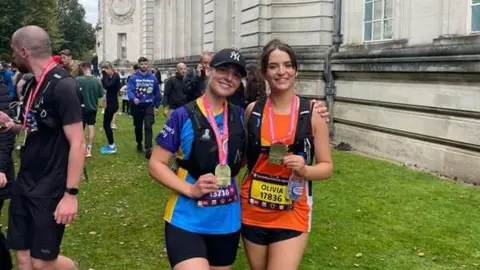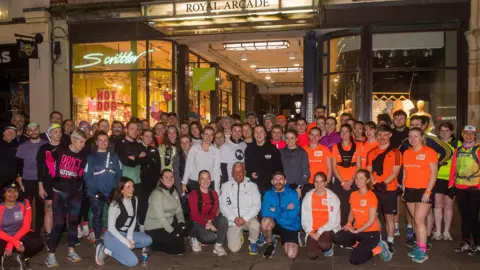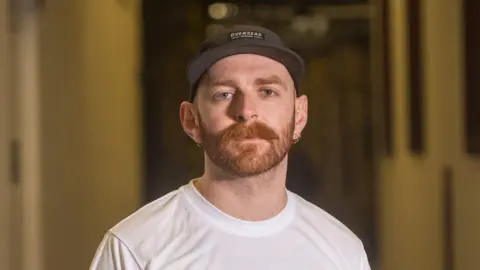'I quit running after being followed home by men'
Olivia Browne was 11 and walking home from school the first time she was sexually harassed by a man.
At 16 she took up running to improve her mental health after a boy sexually assaulted her, however a group of men put a stop to that when they followed her home.
Ms Browne has waived her right to anonymity as a sexual assault survivor to speak to BBC Wales about her ordeal.
It comes as a Sound Cymru survey of 500 men in Wales showed 30% of respondents considered catcalling, the act of making a threatening or harassing remark at a person publicly, not to be harmful - which is up 26% from the previous year.
Ms Browne said men need to take responsibility and call out bad behaviour to improve women's safety.
Warning: This article contains descriptions of sexual harassment and assault
Ms Browne, 24, from Cardiff, said she was 11 when a man slowed his car down to tell her she "looked sexy".
She had a "sinking feeling" that this would be what the rest of her life would be like.
In 2017 she picked up running because she was at "rock bottom" after a boy sexually assaulted her.
"That really affected me. I took time off school, I lost quite a lot of my hair from stress, and I didn't know what was wrong with me at the time, because I had a form of PTSD," she said.
To improve her mental health, she went on her second ever run on a well-used road in the daytime.
A car full of men in their 20s slowed down to drive alongside her and shouted at her to get in.
"I just remember feeling utterly paralysed and sick," she said.
"There was nowhere I could have gone, it was one road."
Ms Browne was forced to run alongside them which she said was "humiliating".
"That really put me off running," she said. "I just remember going home crying my eyes out."
She said she felt there was "literally nowhere for me to go" where she would be "free from harassment or male violence".
In 2024, Ms Browne took up running again when she and her friend began training for a half marathon.
 Phoebe Davies Owen
Phoebe Davies OwenShe said she likes running because of the "escapism" and health benefits but hates that she still gets sexually harassed.
Men have touched her and her friends without their consent, often slow their cars down to stare, and shout, she said.
"I ran past teenagers in the park a couple months ago, they were literally 12 and 13-years-olds and they were shouting things like 'we can see your bum'."
She said women are taught to take precautions to stay safe, for example she shares her location with friends and family, has her music on low-volume, does not run in the dark - she also changes her routes regularly because "you never know who's watching you".
But she says the focus on what women do to stay safe must shift to what men can do to stop gender-based violence.
"I know a lot of men get quite defensive when this topic comes up," Ms Browne said. "It's not all men, but it should be all men's responsibility to change it."
"Women do get murdered, women do get followed, and they do get harmed."
 Mark Lewis
Mark LewisMs Browne said when women are murdered or sexually assaulted they are portrayed as "isolated incidents" but "they've not just spawned out of nowhere".
"It comes from a larger issue, which is behavioural and structural," she said. "They might be your friend, your brother, your family member."
She said that while "the average day-to-day man does not hold the power to change an entire economic political system, everyday men do have the power to call each other out on their behaviour, reflect, and actually do something about it".
Ms Browne said gender-based violence is an epidemic.
"I've had times in nightclubs where I've seen a man literally grab my friend's vagina, and then I've called him out on it, and he's then punched me in the face."
She said she has been locked in a car while on work experience and another time, a man blocked her and a friend from leaving a lift late at night.
She said women should not have to worry about their safety every day.
 Mark Lewis
Mark LewisMs Browne, who is a member of Cardiff's Sunday run club, attended an event on Tuesday by Sound, a Welsh government funded campaign aimed at improving women's safety.
She said conversations with men there revealed sexual harassment is not often spoken about in male friendship groups.
Sound Cymru was launched in 2023 to encourage men aged 18 to 34 to learn about gender-based violence.
In its survey it found 10% of male respondents did not know what sexual harassment was.
 Mark Lewis
Mark LewisLiam Jones, 28, the owner of Overseas Apparel in Cardiff and co-founder of the Overseas Apparel Run Club attended the run and said the only precautions he takes when running is having enough water and planning a route.
"I don't really think about it at all, I'm very fortunate not to have to."
He said it is important that men engage in conversations about sexual harassment, "to understand they are the reason for change".
"We can't just hope women will keep speaking about it, we have to do our part as well," he said.
What can men do to make women feel safe?
Ms Browne said men can help women feel safer by crossing the road if a woman is ahead of them, "to show you are not a threat".
She said being aware of "the space you take up" is important to give women enough room to pass.
Avoiding staring at female runners, especially if you are in a group, makes women feel more comfortable, she added.
"If your friend says something that's out of order, that is harassing, don't tolerate it."
"Try and put yourself in the woman's shoes," she said.
"Men are the key to changing gender-based violence."
If you have been affected by the issues raised, there is help available via the BBC Action Line.
